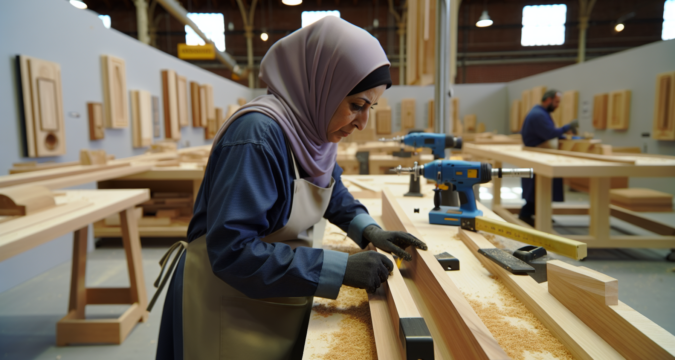
Woodworking is a craft that connects makers across borders, cultures, and oceans. While specific techniques, materials, and project styles may differ across various regions, woodworkers are united by a shared passion. Connecting with woodworking communities globally can expand perspectives, foster innovation, and advance the craft as a whole.
| Key Takeaway | Summary |
|---|---|
| Benefits of Connected Communities | Exchanging knowledge and ideas, sharing innovative techniques, exposure to new materials and cultural traditions, solving problems together |
| Popular Online Forums | Reddit, IWW.org, Lumberjocks, Talkshoplive; region-specific forums like UKWorkshop and CanWoodWork |
| Notable Events | Conferences like AWFS and West Coast Woodworking Show for in-person interactions |
| Cross-Cultural Collaborations | Pursue exchanges to unfamiliar places, say yes to using unknown techniques, proactively befriend woodworkers from different cultures |
| Local Connections | Search woodworking clubs on sites like WoodworkingClub.com; check community calendars at local lumberyards; use NextDoor app |
| Importing/Exporting Challenges | Strict regulations on endangered species; heavy import taxes; shipping costs and customs delays |
Benefits of Connected Woodworking Communities
Joining international woodworking communities provides meaningful opportunities to exchange knowledge and ideas. Woodworkers can share innovative techniques like creative Japanese joinery methods or Nordic style woodcarving. Exposure to new materials not locally available like tropical hardwoods or unique imported veneers widens creative possibilities. Learning about different cultural woodworking traditions like Maori wood carving or Spanish marquetry provides inspiration to makers.
Connected woodworking groups also allow makers to solve problems together. Getting feedback on common workshop issues like reducing table saw tearout or improving dust collection efficiency can save hours of frustration. When woodworkers unite in online forums, books, or in-person events, everyone’s skills improve through shared insights.
Popular Online Woodworking Forums
The internet makes finding and joining woodworking communities easier than ever. Popular forums like Reddit’s r/woodworking group has over 4 million members. Niche subgroups feature specialized discussions around topics like CNC machines, woodturning, or timber framing bringing together enthusiasts. Other sites like IWW.org and Lumberjocks foster friendships and feedback between makers of all skill levels by sharing project photos and build advice. Relative newcomers like Talkshoplive also connect woodworkers through interactive streaming content and video chat capabilities.
Regional Woodworking Forums
Every country has its own popular woodworking forums as well. In the UK, sites like UKWorkshop and Woodworklist are highly active in the community. Canadian woodworkers frequent the CanWoodWork forum and the AustralianWoodworkForums has an engaged membership down under. Finding region-specific groups ensures seeing projects using local wood species and joining in-person meetups when possible.
Notable Global Woodworking Events
Cross-Cultural Woodworking Collaborations
Establishing Meaningful Connections
Prioritize In-Person Interactions While online communities provide convenience, making deep connections with other woodworkers is most impactful face-to-face. Attending conferences like the AWFS or West Coast Woodworking Show allows hands-on skill sharing and mentorship opportunities hard to replicate virtually. Regional woodworking colleges like the Port Townsend School of Woodworking or North House Folk School provide immersive learning experiences as well.
Lean Into Discomfort Stepping outside comfort zones accelerates growth. Pursue exchanges to unfamiliar places, say yes to collaborations using unknown techniques, and proactively befriend woodworkers from different cultures. Opening up to new perspectives, even when difficult, pushes innovation and understanding forward together.
Conclusion
Frequently Asked Questions
How can I find woodworkers local to me to collaborate with? Search for woodworking clubs on sites like WoodworkingClub.com. Check community calendars for classes at local lumberyards. Reach out to makers with social media posts tagging your city. Apps like NextDoor can also connect nearby enthusiasts.
What funding sources exist for international woodworking exchanges? Organizations like the Fulbright Program have woodworking scholarships for global exchanges. Artists residencies through groups like Vermont Studio Center sponsor international makers for retreats. Grants supporting cultural exchanges also assist collaborative woodworking projects.
What challenges exist when importing/exporting materials? Strict regulations restrict bringing certain species of woods across international borders, especially endangered tropical hardwoods. Some countries levy heavy taxes on imported raw lumber or wood products. Complex paperwork, expensive shipping costs, as well as delays at customs offices also complicate global material trades.
External Links
The Woodworkers Guild of America YouTube Channel

